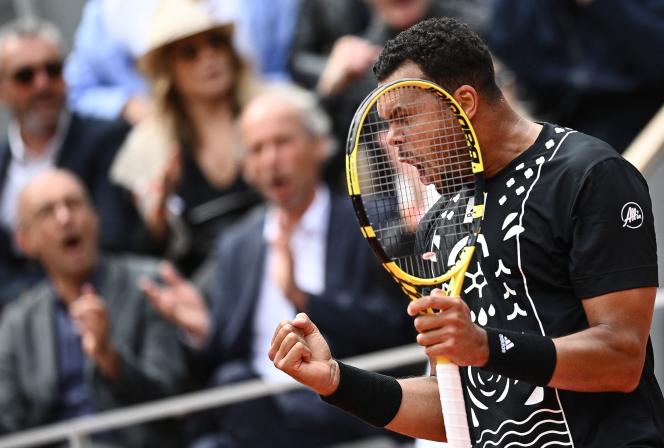We will no longer see Jo-Wilfried Tsonga’s thumb dance on a tennis court. Improvised at its beginnings and continued because the public had adopted it, the celebration of the French player after a victory will no longer return to the courts.
At 37, Jo-Wilfried Tsonga played, Tuesday, May 24, the last meeting of his rich career. Defeated after having fought a good battle against the Norwegian Casper Ruud in the first round of Roland-Garros (7-6 [8-6], 6-7 [7-4], 2-6, 6-7 [0-7]) , Le Manceau bows out. A match in summary of his immense career, alternating moments of grace, grimaces, and an injury at the very end of the match having prevented him from defending himself until the end.
For the start of the 705th and perhaps final match of Jo-Wilfried Tsonga’s professional life, at the start of the afternoon, the public missed the call. The center court was sparse, despite the presence of a small “kop” of supporters who came with drums to accompany their favorite.
The words of Yannick Noah came to mind, after the Manceau semi-final at Roland-Garros in 2013, regretting, hot, that the public had “dropped Jo”. Then entered a half-empty Philippe-Chatrier court, Tsonga had been “deprived of this energy” and “played his first set on neutral ground”, judged the last French winner Porte d’Auteuil. In view of the boiling atmosphere of the football stadium reserved for Benoît Paire, Monday, May 23, on the Simonne-Mathieu court, these words remain relevant.
However, and even if he was moved by what he expected to be his final appearance on clay at Roland-Garros – and last entry on a court as a professional tennis player – Jo-Wilfried Tsonga attacked the meeting without ask questions. As often at Porte d’Auteuil, the one who recognizes “not being a clay court specialist”, has found resources to shine there anyway.
Not an “earthling”, but a real Roland-Garros player
“It’s not a surface on which I had the best results,” admitted the player before the tournament. But Jo-Wilfried Tsonga has always been a real Roland-Garros player. “It was a special tournament for me,” he said on Friday – already speaking in the past tense -, referring to the conditions, the specificity of Parisian clay, and its relationship to the public. “Everything I was doing was really different from what I was experiencing on other tournaments. I always arrived very confident here, although I hadn’t necessarily won many matches in the previous weeks. »
Would he be able to repeat the experience, once again? Defeated in the first round of most of the – rare – tournaments he has played this year and immediately pitted against the tough Casper Ruud, world number 8 and the only Norwegian clay court specialist, Tsonga was aware of the magnitude of the task. to accomplish.
Driven by his efficiency in service, the Frenchman attacked the game with serenity, facing a Norwegian who seemed to lack inspiration. In a Central gradually regaining its atmosphere, the Frenchman won the first round after a perfectly mastered decisive game.
Clenching his fist, “Jo” could smile, he who wanted above all not to miss his farewell. If he no longer has the mobility of his twenty-two years – when he broke through at the highest level, with a final at the Australian Open in 2008 – the Frenchman assured his shots, made few errors , and made his opponent understand that he would have to go and get the victory.
If he lacked “a lot of certainties”, after two years complicated by injuries, Tsonga estimated before the tournament to be “when [he] feels best physically”. If the Frenchman did not give up in the second set, only losing in the decisive game, the end of the game turned to Ruud’s advantage. Caught up by the passage of time, Jo-Wilfried Tsonga was forced to lay down his arms, and lost after more than three and a half hours of play. Not without having fought to the last point in the fourth set, grimacing after a injury preventing him from serving in the decisive game. A heartbreak for the player, rewarded a few seconds earlier by the crowd of a thundering Marseillaise.
A start on a defeat
Jo-Wilfried Tsonga will therefore never have won Roland-Garros. Twice semi-finalist Porte d’Auteuil, the Frenchman will not have managed to touch one of the four Grand Slam trophies. With 19 titles to his credit on the circuit (only Yannick Noah has done better among French players, with 23), including two Masters 1000 – the highest tournaments, with the exception of those of the Grand Slam –, Tsonga n have nothing to be ashamed of his career.
Met a few days before this end clap, the player claimed to have “no regrets”. He who had fought to reach the highest level, who had had to overcome serious injuries, had “led [his] career as he saw fit”, in a discipline where elected officials are rare.
“To be a tennis player, basically, is to be a loser, insisted Jo-Wilfried Tsonga, in an interview with AFP after announcing, in early April, his upcoming retirement. When we play tennis, we lose every week. “Even Roger Federer, considered by many observers to be the greatest player in the history of the little yellow ball, “lost more weeks than he won”, continued the Frenchman.
Tournament after tournament, week after week, a tennis player has to get back to work. “When you’ve lost, you have to be told, ‘You’ve lost, huh? Well, get up, there’s another game. Tomorrow it starts again. And get ready because you’re gonna lose again. You are going to lose today, tomorrow, the day after tomorrow…” That’s our job, that’s tennis. It’s accepting to lose and saying to yourself “Tomorrow I’m going back to win”.
Tomorrow, Jo-Wilfried Tsonga may prepare his saplings to go fishing. But the best French player of the last twenty years will not return to training for the next tournament.
His career ended on Tuesday on the clay courts of Roland-Garros, as he had wanted. If he did not indulge in a final thumb dance, the player kissed the court.

















